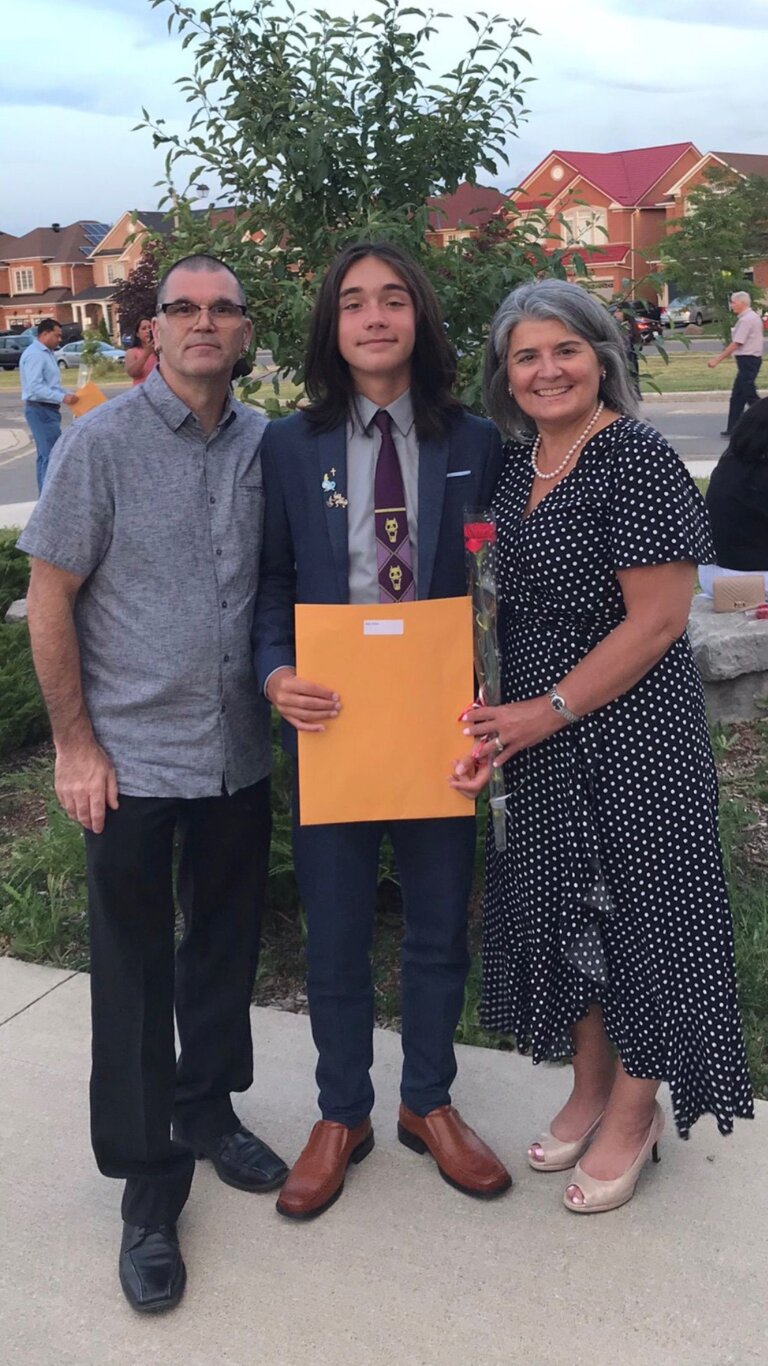Meet Maria: a 53-year-old nurse living in Brampton with her husband and fourteen-year-old son who love spending time together at their seasonal trailer in the summertime. Maria graduated from University of Toronto with her nursing degree and has worked predominantly in public health for the last twenty-four years as a supervisor of Chronic Disease and Injury Prevention. She’s sharing her story in hopes to provide support to others on a similar journey.
Liver Canada: Did you find your medical background helped you understand and to navigate your diagnosis
Maria: It’s interesting to have personally gone through an illness of this magnitude and being on the patient end. I was using my skills to research what the problem was and was still very confused, honestly.
My diagnosis really wasn’t that clear. I had started off with severe pain in my gut which ended up being gallstones. The follow up surgeon found my liver enzymes weren’t coming down and all that investigation takes time seeing specialists. I was convinced it was purely from my gallbladder. My medical background just helped me to be more worried, especially because the diagnosis was not yet formed and complex. Through further tests and investigation, my gastroenterologist then suspected primary biliary cirrhosis (PBC).
Liver Canada: When were you first officially diagnosed?
Maria: I saw a hepatologist in 2019 who did a FibroScan of my liver and confirmed I had developed PBC. This was at stage one of fibrosis, not even cirrhosis. I became more and more symptomatic and developed esophageal varices. This developed into severe ascites which required me to get my stomach drained on a weekly basis. I gained 10-20lbs of fluid every week.
Eventually, because of the pressure of the ascites on my colon, I was rushed into an emergency hernia surgery which prompted my leave from work. I have yet to return.
Liver Canada: How did your liver transplant journey begin?
Maria: I was accepted into the transplant program in January 2021. I did tests and evaluations and got on the deceased donor list in March. I was still in denial; I believe I was in denial the whole way through. I had fears about death and leaving my young son and my family. I felt useless, worthless and did not accept the diagnosis of end-of-life liver disease as I wasn’t actually in pain at that point. The only thing I was complaining about was extreme fatigue and ascites. How did they really know my liver was cirrhotic? My only scan was at stage one – how did I get here? Once I got on the list, I immediately thought, am I going to get a call today? I started to build a nervous anticipation – I was waiting for a major life change. Am I going to make it through the operation? It felt like a looming uncertainty – I didn’t know what to do and I felt lost. This is when I reached out to counselling to help deal with the start of my liver transplant journey.
Liver Canada: Through your transplant journey, you had a living donor, how did that whole process go for you?
Maria: The liver transplant process has saved my life and was overall a positive experience. I was told that a living donor would be a good option for me because PBC patients do really well with living donor donations, as it was a fairly simple transfer. Coincidentally at the time, a connection of a friend of my husband had sent along his social media campaign – his ask for a kidney. I decided that while I was sitting waiting for a deceased donor, to increase my chances, I would create my own Facebook campaign. Within the first two weeks of the campaign, I had six people register and fill out eleven pages of forms to be my living donor. A combination of people I knew and strangers. I was feeling very overwhelmed and blessed with the kind outpour of love and support.
My living donor ended up being a very close friend of mine, who is part of my ‘mom’s support group’. She was a perfect match and I had asked her “Why do you want to do this for me?” She had lost her husband to colon cancer at 40 and had three kids at home. She told me it was a “choice, not an obligation”. I am so grateful that we recently celebrated our one-year liver transfer anniversary in the presence of family and friends.

Maria with her living donor.
Liver Canada: How was your recovery process?
Maria: It was a long recovery where I spent twenty-five days in the hospital with a psychotic episode that was intense and difficult. My husband would come visit me after work, driving across cities to make sure that I would have some family support for even just an hour a day. Being alone during tight COVID-19 hospital restrictions and not mentally well, really gave me perspective on the patient experience and how orientation to your new environment is so important – even the little things, like a clock to know what time it is.
Liver Canada: Is there anything else, any other messages that you want people to know about your story?
Maria: I’ve started to really reflect on my one year [anniversary]. Recovery has had it’s challenges and I have really appreciated being encircled by my extensive health care team of professionals that includes Transplant Hepatologist, Respirologist, Nephrologist, Rheumatologist, Counsellor etc. I have paid much attention to both my mental and physical health and wellbeing during this journey. I am so grateful to have a second chance at life and I want to give back.. Through my Facebook page, I have continued to post updates about my journey and milestones, in hopes of inspiring others experiencing a similar situation to have faith and hope for their future. I have had people reach out to me for questions about PBC and what it’s been like for me. By sharing my story, I feel that I have found a new purpose in life- to help others going through their own liver transplant journey and supporting them to keep positive.
Liver Canada: Do you have any words of wisdom for someone in a similar position?
Maria: Going through the many steps involved in pre-diagnosis to diagnosis and then transplant is very challenging and can take its toll on your emotional well-being as well as physical health! Stay strong, reach out to professionals and advocate for your own health if you feel like you aren’t getting the answers and plan you need to help you in your journey. There are many resources and people you can rust for credible information out there. Do your research and ask for help. I think increasing your awareness of your diagnosis and remembering that knowledge is power is so important. At this point in my journey, I have a great desire to support others on their journey and to participate and be involved in sharing my experience to inspire hope in others. Life is worth living and my donor has made that possible for me!
Check out Maria’s Facebook page to stay up to date on her liver health journey: facebook.com/maria.g.m.morais
If you find yourself in a similar position as Maria and need more information on your liver disease diagnosis, you can connect with our education team at any time by phone or email. You can also access our Information Hub to find trusted information and insights.
National Help Line: 1 (800) 563-5483
Available Monday to Friday from 9-5 EST
Email: CLF@liver.ca
Email us anytime

